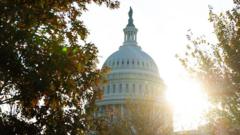Are Syria's Minorities at Risk After Assad's Fall?

Published: 2025-11-10 07:00:11 | Category: technology
The recent violence in Syria highlights a disturbing trend of sectarian killings, particularly targeting Alawites and Christians. The tragic case of Wissam and Shafiq Mansour, who were shot dead in a coffee shop in Wadi al-Nasara, exemplifies the precarious security situation in the country following the fall of the Assad regime. With the rise of Islamist factions, many communities feel increasingly vulnerable, fearing for their safety and future in a nation once united under Assad.
Last updated: 01 November 2023 (BST)
What’s happening now
The situation in Syria remains dire as sectarian revenge attacks continue to plague various communities. Following the fall of Bashar al-Assad's regime in December 2022, the power vacuum has led to increased hostility between different sects, primarily targeting Alawites and Christians. The recent killings of two Christian cousins in Wadi al-Nasara have heightened fears that a cycle of violence is emerging, threatening to destabilise the fragile peace that many hoped for after the regime's fall.
Key takeaways
- Recent attacks have primarily targeted Alawites and Christians, indicating a rising trend in sectarian violence.
- The killings of Wissam and Shafiq Mansour on 1 October underscore the dangers faced by minority communities.
- Local residents feel abandoned by authorities and fear for their safety amid escalating violence.
Timeline: how we got here
The recent surge in sectarian violence can be traced back to key moments in Syria's tumultuous recent history:
- March 2022: Large-scale sectarian violence breaks out, with significant casualties reported.
- December 2022: The Assad regime is overthrown, leading to a power vacuum and increased sectarian tensions.
- 1 October 2023: Wissam and Shafiq Mansour are murdered in Wadi al-Nasara, highlighting the immediate dangers faced by Christians.
- Late October 2023: Reports indicate a continued rise in violence, particularly against Alawite communities in Homs province.
What’s new vs what’s known
New today/this week
The killings of Wissam and Shafiq Mansour represent a new high in violence against the Christian community in Syria, marking a troubling escalation in sectarian tensions. This incident has prompted outrage and fear among local residents, who are increasingly feeling abandoned by the new government.
What was already established
The pattern of violence against Alawites has been ongoing, with a notable increase in attacks attributed to revenge motives against those associated with the former regime. Reports from various human rights organisations have documented these trends, indicating a systemic targeting of minority groups in Syria.
Impact for the UK
Consumers and households
While the immediate impact of the violence is felt in Syria, the repercussions can extend to UK citizens through increased refugee flows. As communities face violence, many individuals may seek asylum in the UK, raising questions about how the UK will respond to this humanitarian crisis. The safety and welfare of these refugees become a concern for British authorities and NGOs involved in resettlement efforts.
Businesses and jobs
The ongoing violence disrupts local economies, including those of returning expatriates hoping to rebuild businesses. Many are now reconsidering their investments in Syria, leading to potential job losses and economic instability within the region. This could also affect UK businesses looking to invest or trade in the area.
Policy and regulation
The UK government may need to reassess its foreign policy regarding Syria and consider humanitarian aid or intervention to protect vulnerable communities. Discussions around asylum policies and support for Syrian refugees are likely to continue, as the situation evolves.
Numbers that matter
- At least 40 Alawites have been killed in separate attacks in Homs province from June to October 2023.
- Over 1,400 people were reported killed in violence in March 2023, with many being Alawite civilians.
- Approximately 2,000 individuals lost their lives in July 2023 during another outbreak of sectarian violence.
Definitions and jargon buster
- Alawite: A sect of Shia Islam, which has historically held power in Syria under the Assad regime.
- Wadi al-Nasara: A valley in Syria, known as the Valley of the Christians, where many Christian communities reside.
How to think about the next steps
Near term (0–4 weeks)
In the immediate future, it is vital for the international community to monitor the situation closely. Increased violence may prompt further displacement of communities, leading to a humanitarian crisis.
Medium term (1–6 months)
Long-term stability will depend on the establishment of a legitimate and inclusive government that addresses the grievances of all sects. Monitoring human rights abuses and providing support to vulnerable communities should be priorities.
Signals to watch
- Reports of violence and killings in Homs and surrounding areas.
- Responses from the interim government regarding security and protection for minority communities.
- International reactions, particularly from humanitarian organisations regarding refugee flows.
Practical guidance
Do
- Stay informed about the evolving situation in Syria, especially regarding safety for minority communities.
- Support organisations that provide aid to Syrian refugees and those affected by violence.
Don’t
- Assume that conditions will improve without international intervention and support.
- Dismiss the voices of those affected by violence; their experiences are crucial for understanding the situation.
Checklist
- Stay updated with reliable news sources on the situation in Syria.
- Engage with local charities supporting Syrian refugees.
- Advocate for policies that support human rights and protection for minorities in conflict zones.
Risks, caveats, and uncertainties
The situation in Syria is fluid, and many factors could change rapidly. The role of extremist groups and their influence on the ongoing violence remains uncertain. Additionally, the intentions and capabilities of the interim government to protect vulnerable communities are yet to be fully assessed. Caution is necessary when drawing conclusions about the future stability of the region.
Bottom line
The current violence in Syria underscores the fragility of peace following the Assad regime's fall. With rising sectarian tensions and targeted attacks against minority communities, the future remains uncertain. Supporting humanitarian efforts and advocating for the protection of all citizens, regardless of their sect, will be crucial in the coming months.
FAQs
What has caused the recent sectarian violence in Syria?
The recent sectarian violence in Syria has been driven by revenge attacks and the targeting of minority groups, particularly Alawites and Christians, following the regime's fall.
How is the UK responding to the situation in Syria?
The UK is likely to reassess its foreign policy towards Syria, considering humanitarian aid and support for refugees as violence escalates.
What can be done to support affected communities in Syria?
Supporting organisations that provide aid to Syrian refugees and advocating for human rights protections will be vital for assisting affected communities.



